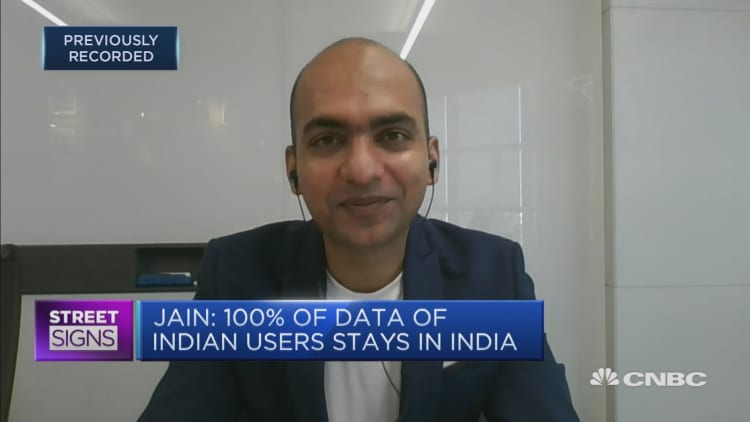
Growing anti-China sentiment in India has not had any material impact on Chinese smartphone maker, Xiaomi, the company's India boss said on Thursday.
In the last six years, Xiaomi India built a strong local culture and company, managing director Manu Kumar Jain told CNBC's "Street Signs Asia."
"Our product team, R&D teams are here in India. As we have mentioned, all (of ) our phones, majority of our TVs are made in India, large number of components are locally sourced ... entire leadership team is in India," Jain said.
"Till now, we are not seeing any major impact on our business, with respect to sales or demand," he added.
Xiaomi is India's top smartphone maker and owns about 30% of the market currently, according to data from Counterpoint Research. In fact, apart from Samsung, the rest of the top five phone makers in the Indian market are Chinese firms.
Relations between New Delhi and Beijing deteriorated in recent weeks due to a border clash high in the Himalayas that left 20 Indian soldiers dead. Diplomatic efforts are being made to deescalate the situation between the two nuclear powers. But public sentiment in India toward Chinese brands and products have soured, with calls emerging for a boycott.
For its part, Xiaomi has been covering its branding outside retail stores with a "Made in India" logo, fearing that people may damage the shops due to anti-China sentiments, local media reported. It also reportedly asked its shop floor promoters to not wear the brand's uniform.
Jain added that the company has seen some backlash on social media, but that has not affected sales or demand.
India is also reportedly planning higher import duties and trade barriers on around 300 products from China and elsewhere, according to Reuters, which cited two government officials. The plan had reportedly been under review since at least April, before the border clash occurred. It is in line with Prime Minister Narendra Modi's campaign to make India self-reliant and to promote local products, the news wire said.
Potentially higher tariffs are not a "major concern" for Xiaomi as more than 99% of its phones sold in India are made locally, according to Jain.
"And, not just phones — 65% of these components are locally sourced or locally manufactured. So, if you look at the amount of components we buy from outside, it's actually very low," he said, adding, "Even if there is any additional import duty, the impact on our business is going to be negligible."
The coronavirus pandemic, however, is a source of "genuine concern" for the company, which has seven manufacturing plants in India. Jain explained that India's shutdown had left Xiaomi with a shortage of manpower across all areas of business, including manufacturing, warehousing and delivery.
The government is now allowing the company's factories to operate with about a third of their manpower, running limited shifts that follow social distancing guidelines. But the measures have slowed down the company's resumption of production, according to Jain.
"We haven't been able to ramp up to the same level as pre-Covid," Jain said, referring to the disease caused by the coronavirus. He added that Xiaomi expects production to return to pre-pandemic levels later this year.
India has more than 473,000 reported cases of infection, though the health ministry says the recovery rate is higher than current active cases.
Jain addressed media reports which alleged Xiaomi was recording millions of people's private web and phone use. He said all data collected by the company — with consent from users — is anonymized, aggregated and encrypted, which means individuals cannot be tracked based on that information. All data collected in India stays within the country on Amazon Web Services servers, he said.


